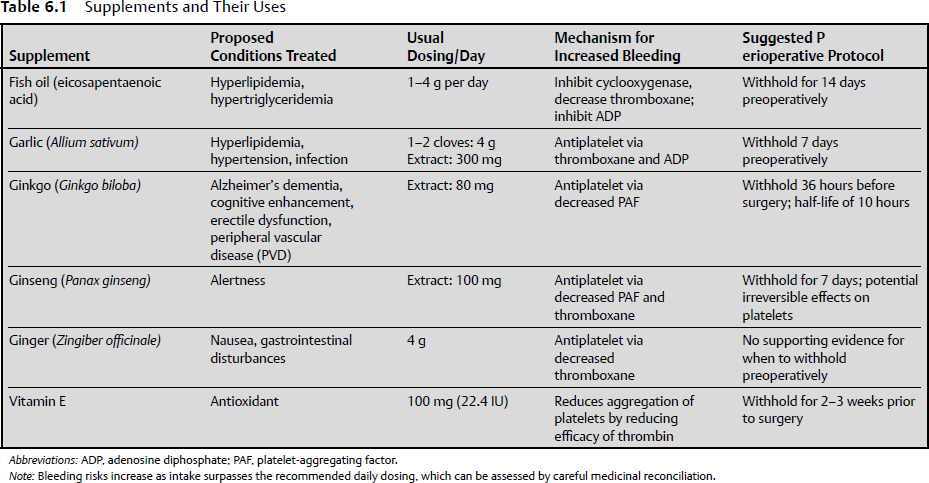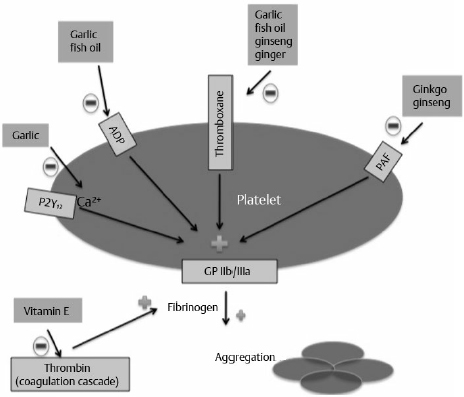6 A neurosurgical procedure may be meticulously planned for hemostasis preoperatively, intraoperatively, and postoperatively. But some outside influences may prove bothersome or outright dangerous to patients. Some of these influences occur in the form of extraneous substances, such as fish oil, herbal supplements, and vitamin E. Table 6.1 summarizes the supplements that are discussed in this chapter.1 The increased use of herbal supplements warrants consideration in all patients.2 Neurosurgeons must be familiar with the potential perioperative effects of such substances.3 A recent evaluation of perioperative neurosurgical patients focused on platelet count, partial thromboplastin time (PTT), and prothrombin time/international normalized ratio (PT/INR).4 We advocate strict screening of herbal and dietary supplements because of their potential to alter hemostasis in the neurosurgical patient and because of the serious possible consequences of even small amounts of bleeding in the confined space of the skull. Fish oil may pose the most substantial risk to the neurosurgery patient, given its widespread use in the general population.5 Fish oil (omega-3 fatty acids) is taken by the patient, or prescribed by a physician, to reduce triglycerides and hyperlipidemia. The recommended dose for fish oil is 1 to 4 g per day.6 Research has suggested that fish oil may affect platelet composition and alter platelet function. Bleeding time has been elevated in healthy volunteers.7 The mechanism appears to be related to adenosine diphosphate (ADP) blockade and thromboxane.7,8 Some authors have downplayed fish oil’s effect on platelets.6,9,10 A recent article with an extremely small sample size suggested that fish oil was safe in spine surgery.11 But this conclusion seems unwarranted at this early juncture. Of particular concern would be cranial surgery because there are no studies to support the use, or the cessation of use, of fish oil. The theoretical and anecdotal risk remains high. In our practice, until further evidence becomes available, we have chosen to delay elective surgery for 2 weeks in patients who were taking fish oils to allow the effects to dissipate. Fig. 6.1 provides a simplified mechanistic diagram of the interplay between coagulation factors and supplements. Garlic (Allium sativum) is of the onion family and has gained commercial popularity among herbal treatments over the last decade. In 2009, it was the fourth biggest selling herbal supplement, with sales of more than $17 million in the United States.2 The purported benefits include lowering blood pressure and cholesterol, and prevention of infections and of myocardial infarction.12 The underlying mechanism of the proposed benefits involves its antiplatelet activity. In vitro and in vivo studies have shown the antiplatelet activity to be mediated through blockade of the ADP receptor, thromboxane reduction, and reduction of calcium mobilization.13 Evidence of increased bleeding risk in patients who take garlic has been noted in multiple case reports of spinal epidural hematomata and postoperative bleeding. In addition, studies have shown that there is a significant interaction with warfarin and aspirin, resulting in increased and unpredictable drug effects on anticoagulation.14 Although these data do not come from randomized controlled trials, there has been a general consensus to recommend withholding garlic 7 days preoperatively.3 Ginkgo (Ginkgo biloba) is an herbal preparation from the ginkgo tree, also known as the maidenhair tree. The use of this herbal remedy can be traced centuries back in Chinese history, and over the last decade it has become one of the top selling herbal supplements in the United States. Ginkgo can be taken in tablets, capsules, sublingual sprays, nutrition bars, and energy drinks. The proposed benefits include prevention of onset of Alzheimer’s dementia, increased attentiveness and information processing, and treatment of erectile dysfunction and peripheral intermittent claudication.15 The principle behind the proposed benefits of increased cognition is thought to be increased blood flow, through direct antiplatelet effects and through increased oxygen extraction by brain tissue. In vitro studies have shown that antiplatelet activity may be mediated by reduction of the effect of platelet-activating factor (PAF).16 Increased predisposition to bleeding has been reported in case reports, including spontaneous intraparenchymal hemorrhage, subarachnoid hemorrhage, and subdural hematomata. However the majority of case reports mention concomitant use of aspirin or warfarin. Although studies have found no hemorrhage in cohorts of healthy volunteers, the general consensus from the reported instances of hemorrhage is to withhold ginkgo preoperatively. Due to a half-life of only 10 hours, the recommendation is to withhold it for at least 36 hours before surgical intervention.3 Ginseng (Panax ginseng) is a perennial plant found in China, Korea, and Vietnam. Extracts have been used as a stimulant and can be found in tablet form even in energy drinks. Scattered case reports of ginseng’s causing bleeding have prompted in vitro studies demonstrating antiplatelet activity by inhibition of thromboxane production and PAF.17 Excessive bleeding has not been reported when intake is limited to daily dosage recommendations. But due to potential irreversible effects on platelets, the current recommendation is to withhold ginseng 7 days preoperatively.3 Ginger is a tuber of the Zingiber officinale plant. It is used as a remedy for nausea, dyspepsia, and gastrointestinal disturbances. Historically, ginger can be traced to cultivation in China thousands of years ago. There are no reports in the literature of clinically relevant hemorrhage attributed solely to ginger intake. However, in vitro and animal studies have shown antiplatelet activity by modulation of the aggregation pathway through thromboxane inhibition. There is no supporting evidence to guide perioperative management; however, if a patient has used ginger supplementation for a prolonged time at above the daily recommended dose of 4 g, consideration should be given to recommending preoperative cessation. Vitamin E has gained popularity for its antioxidant properties. The recommended daily dietary allowance is 15 mg, but commercially available supplements are frequently 10 to 20 times that amount.1 Reports of anticoagulation properties and even incidents of subarachnoid hemorrhage have been noted with doses as low as 50 mg per day,18 but this finding has been inconsistent at best. In a study of healthy volunteers, increased bleeding risks were shown to be mediated through an effect on thrombin-mediated platelet aggregation.19 No strong supporting evidence exists for perioperative management of vitamin E use, but some surgical practices recommend 2 to 3 weeks of cessation prior to surgery.20 • Herbal supplements may influence the coagulation status of a patient, and their use must be screened for preoperatively. • The administration of fish oil may elevate bleeding time. • Garlic, ginseng, ginger, and ginkgo have antiplatelet properties. • Vitamin E may influence thrombin-mediated platelet aggregation.
Herbal Products and Supplements Affecting Coagulation
Fish Oil
Garlic
Ginkgo
Ginseng
Ginger
Vitamin E
Herbal Products and Supplements Affecting Coagulation
Only gold members can continue reading. Log In or Register to continue

Full access? Get Clinical Tree









